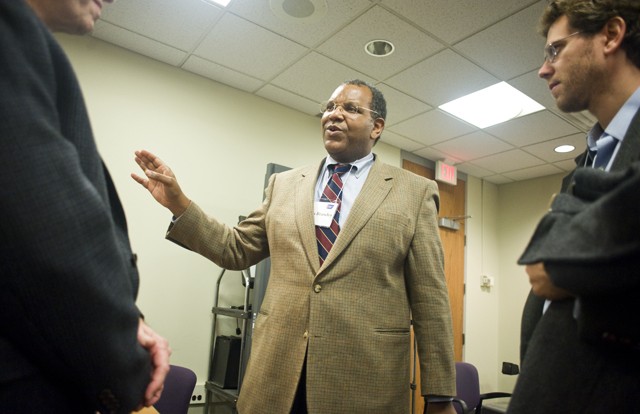Prostate and breast cancer screenings have been overemphasized, American Cancer Society Chief Medical Officer Otis Brawley said at Lillihei Heart Institute Friday. Brawley was meeting with about 20 University of Minnesota doctors and researchers to discuss research grants, but he took time to address his comments in a New York Times article that ran last week about cancer screenings. The article said the American Cancer Society may have overstated the benefits of screening for these cancers. Brawley is quoted saying, âÄúAmerican medicine has overpromised when it comes to screening,âÄù and that the society is changing its online message to include information about risks. His comments drew critiques from others who said this message will confuse people, and they may choose not to be screened. âÄú[People] thought I was saying all screening is bad … [that is] not true,âÄù Brawley said at the University meeting. Screening for breast cancer in women over 50 can âÄúclearly save lives,âÄù but overscreening, particularly in prostate cancer, may be harmful, because some tumors never develop into something dangerous. Then people are âÄúcured of a cancer they didnâÄôt need to be cured of,âÄù Brawley said. Dr. Selwyn Vickers, associate director of translational research at the UniversityâÄôs Masonic Cancer Center, said the issue boils down to the fact that cancer âÄúis not simple.âÄù Journalism professor and health news blogger Gary Schwitzer said itâÄôs important to quantify the harms of screening as well as benefits. Schwitzer said people should picture going to the stadium, âÄúand just carving out a section of 1,400 men, you have to screen all of them, for 10 years, in order to save one life,âÄù he said. With breast cancer, Schwitzer said 2,000 women would need to be screened. For the people who receive false positives from testing, it causes âÄúincredible anxiety,âÄù and most people do not want to stop testing there, Schwitzer said. They often choose to receive a surgical biopsy, which is âÄúnot a walk through the park,âÄù he said. The idea of overscreening is not new. Brawley said it originated in the 1970s. Brawley, a soft-spoken doctor and self-titled âÄúscience nerd,âÄù took over the post of Chief Medical Officer of the American Cancer Society in July 2007. Under Brawley, it has been a âÄúdifferent cancer societyâÄù Schwitzer said. He said Brawley is more vocal and honest about the uncertainties, and does not oversell screening tests. The American Cancer SocietyâÄôs message about screening risks will be added to its Web site in the next three or fourth months, Brawley said.
Cancer screenings often ‘oversold’
The chief medical officer of the American Cancer Society addressed overscreening for breast and prostate cancer.

Image by Jules Ameel
Chief Medical Officer of the American Cancer Society Otis Brawley talks with researchers at the Lillihei Heart Institute on Friday.
Published October 25, 2009
0

